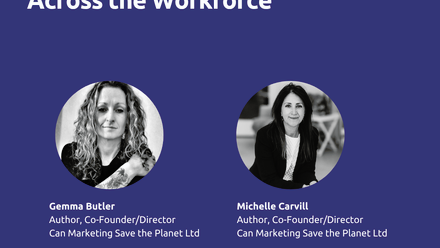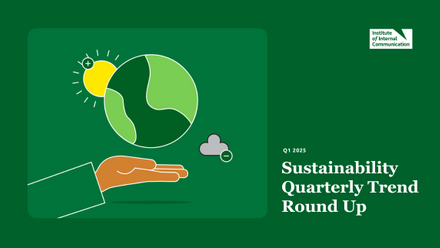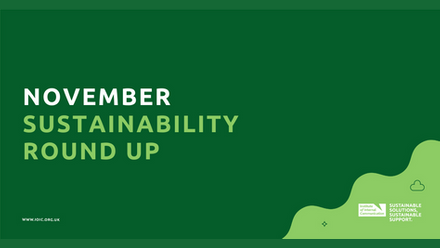ORGANISATIONAL SUSTAINABILITY
The way people find information online has fundamentally changed. Anyone using Google recently will have noticed how AI results now appear at the top of search results pages.
AI's burgeoning energy demands go some of the way to explaining why Google's carbon emissions have risen 51% since 2019.
The tech giant reported 27% higher electricity consumption year-on-year, as data centres powering AI models like Gemini require enormous power. By 2026, it’s estimated Google’s power requirements will equal that of Japan’s, which is the world’s third largest economy. Despite renewable energy investments, Google struggles to decarbonise whilst meeting AI's exponential energy needs.
Similarly, even if Amazon does expand the number of locations that use treated wastewater for data centre cooling from 20 to 120, like Google, it won’t join Time Magazine’s World's Most Sustainable Companies list anytime soon.
Emissions from the retail behemoth’s delivery fleet soared between 2019 and 2023, and its newest data centre will guzzle millions of gallons of water and the energy equivalent of one million homes every year.
The organisations we work for are unlikely to be in the two tech titans’ resource-consumption league, of course. Nevertheless, the above statistics should give us pause to think and revisit how we talk about sustainability issues within our own workplaces.
All organisations face rising pressure to meet sustainability goals. Even in the rare case these objectives aren’t a legal requirement, increasingly discerning stakeholders expect to see commitment to net-zero initiatives.
Some businesses are facing political backlash against their environmental initiatives, leading many to under-communicate their sustainability efforts. However, silence does nothing to build those all-important levels of trust that organisations need. And despite populist rhetoric, consumers continue to demand sustainable products and employees favour environmentally responsible employers.
Companies need transparent communication strategies that are positive without being unrealistic. In Harvard Business Review, experts suggest three key approaches:
Understand stakeholder expectations – research specific concerns rather than making assumptions.
Connect emotionally through storytelling – combine facts with human narratives. Use accessible language ("extreme weather" rather than "1.5°C warming") and avoid jargon like "sustainability journey”.
Expand beyond annual reports – create year-round content across multiple channels. Transform static reports into interactive digital formats and repurpose content into smaller pieces for social media and other platforms.
Ultimately, organisations need to thrive in an increasingly resource-restricted world. And these communication approaches go some way to helping build colleague engagement, consumer loyalty and investor confidence.
ECONOMIC SUSTAINABILITY
A new report from the International Panel on the Information Environment reveals misinformation risks turning the climate crisis into a catastrophe.
In a review of 300 studies, researchers found false claims from fossil fuel companies, right-wing politicians and nation states are deliberately obstructing climate action.
Climate denialism has evolved beyond outright rejection of the facts to discrediting green energy solutions. For instance, renewable energy was falsely blamed for Spain's power blackout earlier this year. Online bots and trolls amplify such narratives, whilst political leaders and regulatory agencies are under increased pressure to delay action.
Against this worrying backdrop, Brazil is rallying nations behind a UN initiative to crack down on climate lies. Meanwhile, UN special rapporteur, Elisa Morgera, has called for the criminalisation of misinformation and greenwashing by the fossil fuel industry.
Elsewhere, climate communications expert Dr Genevieve Guenther argues that we’re already in a “fight for life” and that economic assumptions about climate risks are fundamentally flawed. She says Nobel laureate William Nordhaus's models dramatically underestimate the extent of the damage wrought by the climate emergency by excluding catastrophic risks, tipping points and numerous cost categories. His faith in capitalism's ability to decouple from planetary constraints is both "absurd and unscientific", she claims.
Guenther also challenges the notion that wealth – whether at a personal, organisational or national level – provides protection. She emphasises that climate change affects everyone as a "slow-moving but accelerating crisis".
All this indicates traditional economic risk assessments severely underestimate climate-related financial exposures. Organisations should re-examine their sustainability strategies and recognise that current economic models inadequately price catastrophic climate risks, potentially leaving businesses dangerously exposed to unprecedented systemic disruptions.
By encouraging colleagues to explore these concerns, internal communicators will help protect longer-term economic sustainability, wherever possible.
COMMUNITY SUSTAINABILITY
The world's largest banks dramatically increased fossil fuel financing in 2024, committing £869 billion to coal, oil and gas companies. That’s a whopping £162 billion rise on 2023. Two-thirds of the biggest 65 banks expanded fossil fuel lending, reversing previous declining trends. Perhaps unsurprisingly, US banks dominated, with JPMorganChase leading at £53.5 billion, followed by Bank of America and Citigroup.
This surge contradicts banks' own climate commitments, with major US institutions withdrawing from the UN-sponsored Net Zero Banking Alliance in January 2025. In fact, since the Paris Climate Agreement, banks have channelled an eye-watering £7.9 trillion into fossil fuels, undermining global climate goals.
We already know the world’s poorest communities are disproportionately affected by climate change. However, despite some banks rowing back on climate commitments, glimmers of optimism are emerging from the more progressive end of the sector.
The Inter-American Development Bank (IADB) has unveiled an innovative plan to unlock trillions for climate finance in developing countries, for instance. The scheme uses taxpayer-funded development banks to purchase existing renewable energy loans from private lenders in poorer nations.
By repackaging these loans with development bank guarantees, they become attractive to institutional investors like pension funds, previously restricted by credit rating requirements. This ‘virtuous circle’ frees up private capital for new green projects, whilst enabling loan originators to invest in additional renewable schemes. IADB expects to launch a £500 million-£1 billion pilot programme before COP30.
Meanwhile, we’re witnessing the emergence of energy communities across Latin America. These local clean energy systems are aimed at tackling energy poverty and put communities first. Unlike large-scale renewable projects that often exclude local populations, they enable energy independence and economic transformation with minimal environmental impact. They’re exactly the sort of green projects the IADB is looking to unlock finance for.
This highlights a critical juncture for sustainable development. Whilst traditional banking continues to fuel climate change, innovative financing mechanisms could democratise clean energy access. Community-led projects demonstrate that sustainable transitions need not replicate traditional extractive models, instead prioritising local ownership, energy security and economic empowerment in marginalised regions.
ENVIRONMENTAL SUSTAINABILITY
The World Economic Forum is arguing for a fundamental mindset shift, from tech-first to climate-first innovation. Whilst technological advancement in robotics, 5G and electric vehicles is accelerating, green innovation lags behind.
Current innovation models prioritise rapid upgrades and convenience over environmental impact. Consumer electronics still generate colossal e-waste, whilst AI and data centres dramatically increase digital carbon footprints. Training one large language model produces emissions equivalent to five petrol cars over their lifetimes.
There are however emerging reasons for optimism. For instance, scientists have used AI to develop revolutionary paint formulations that keep buildings 5-20°C cooler than conventional paint. This will potentially reduce air-conditioning costs significantly.
Elsewhere, Microsoft has launched AI tools that design new inorganic materials used in solar panels and medical implants. This exemplifies how machine learning is transforming materials science, enabling more rapid discovery of new substances for electric motors, carbon capture and batteries, promising substantial energy savings through accelerated paths to development.
In tandem, global solar energy shows extraordinary expansion. Renewables made up 96% of worldwide demand for new energy in 2024. The world now installs one gigawatt of solar infrastructure every 15 hours. And after taking 68 years to reach one terawatt capacity, the second terawatt was achieved in just two years by 2024, with the third expected within months.
Three forces must align for sustainable transformation: policy, capital and culture.
The European Green Deal exemplifies regulatory direction, though gaps remain around technologies like AI. Financial backing requires redirecting fossil fuel subsidies (£7 trillion in 2022) towards clean solutions. COP29 pledged to triple climate finance to £300 billion by 2035.
Cultural acceptance proves equally vital, requiring community engagement and climate literacy and education. Companies like Unilever, Microsoft and Tech Mahindra are demonstrating practical implementation through sustainable packaging targets, billion-pound climate funds and AI-powered code optimisation.
Internal communication is a crucial catalyst, translating climate-first principles from boardroom strategy into operational reality. By fostering organisational climate literacy and embedding sustainability narratives into daily discourse, communications teams ensure responsible innovation becomes ingrained in corporate culture – rather than remaining merely compliance-driven.
PERSONAL SUSTAINABILITY
Scientists at Heriot-Watt University have discovered climate change could be altering the flavour of gin and tonic. That’s because volatile weather patterns are impacting juniper berries – gin's key botanical ingredient.
Research across European regions found wet harvest years reduce certain compounds in the berries by 12% compared to dry years. This affects gin's distinctive botanical notes. Increased rainfall requires longer drying periods, altering water-soluble chemicals and shifting flavour profiles – posing risks to the multibillion-pound industry's consistency and quality standards.
Perhaps it takes something like the threat to a downtime treat to remind us how the climate emergency will impact even the most cherished rituals and simple pleasures, in myriad ways.
It also brings into focus the ‘personal’ element of the climate emergency, and raises broader questions about individual versus collective responsibility for environmental sustainability.
Whilst systemic change is, of course, essential, individual responsibility remains crucial. Rather than viewing personal and collective action as competing approaches, we should regard them as interconnected. Individual behaviour changes foster the social learning process necessary for effective collective action.
When people consciously consider their environmental impact, they develop the understanding and values that underpin systemic change. The cognitive process of analysing environmental costs and benefits becomes habitual, reinforcing awareness of planetary wellbeing alongside personal needs.
This ‘learning by doing’ approach also helps build the political and social momentum required for larger institutional transformations towards sustainability.
It behoves internal communicators to emphasise to colleagues that modest changes – whether at work or beyond – can generate significant positive outcomes when embraced en masse, whilst fostering the shared consciousness needed for substantial systemic change.






